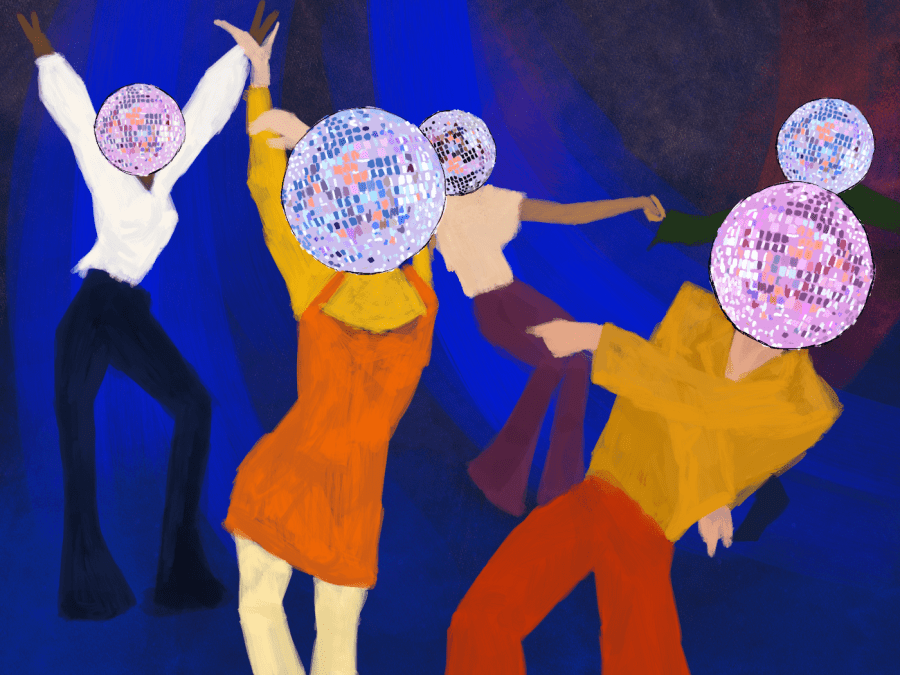‘Discoholics Anonymous’ breathes life back to disco
Discoholics’ second album “Discoholics Anonymous” proves as addictingly groovy as its first.
Discoholic’s second album “Discoholics Anonymous” is a humorous and groovy take on disco. (Illustration by Vedang Lambe)
September 15, 2022
“Decades have passed since people tried to kill disco, but disco never died…it was only on vacation” is the slogan to Discoholic’s second album “Discoholics Anonymous.”
The album goes further than a simple celebration of disco: it endorses disco as a lifestyle. With the anonymous figure behind Discoholic describing themself as a “bartender of discoholic beverages,” it’s clear that their disco can become addictive. The album cover — featuring a support group of “discoholics” complete with disco balls for heads and in various stages of disco addiction — perfectly embodies the message of “Discoholics Anonymous”: party hard and have fun while listening to the album, but be prepared for the withdrawal symptoms when it’s over. Just one taste of “Discoholics Anonymous” is so enjoyably funky that it threatens to catapult the listener into a full-blown disco addiction.
Though Discoholic began as a solo project, it has since expanded into a collective of musicians who aim to bring the joy of disco back into the cultural limelight. Discoholic takes inspiration from classic disco acts such as The Bee Gees and Earth, Wind & Fire. It also draws influence from R&B and artists like Salt-N-Pepa and Daft Punk to create fresh disco tracks that still call back to the golden age of the genre.
“Discoholics Anonymous” is just as much a feast for the eyes as it is for the ears. In anticipation of their latest album, Discoholics released a trailer for “Discoholics Anonymous” which is stylized as a 1980s infomercial. Every track is teased as though they are individual as-seen-on-TV products to be sold, complete with customer testimonials raving about their experiences while listening to the album.
The title track, “Discoholics Anonymous”, starts the album off with an introductory beat using landline phone sounds, then immediately vaults into a classic disco groove, complete with a chicken-scratch rhythm guitar and electric keys. The anonymous hotline vibe is legitimized even further with snippets of callers voicing their issues with “discoholism.” One caller states, “I can’t stop dancing, I just can’t stop moving!” The listener is lulled into the funky yet familiar melodies of every song, which seem to glide into the next. The tracks are repetitive in the way that every song follows the same instrumental, rhythmic and lyrical formula.
Although not the best for everyday listening, the predictable pulsing of “Discoholics Anonymous” provides for an ideal dance club soundtrack. A funky bassline, electronic keys and other typical disco sounds are present in all of the album’s songs, which creates a musical pattern that you begin to anticipate. “Discoholics Anonymous” reliably delivers on its promise of providing danceable tunes in every single track.
The seventh track of the album, “Tipsy,” stands out due to its original composition compared to the rest of “Discoholics Anonymous.” The song is more clearly defined from the rest of the album through the clear inspiration it takes from jazz. It opens with the tangy sounds of a busy jazz bar, which are then followed by a refreshing big-band-inspired melody, featuring a jazz piano and solo drum on top of a more traditional disco beat.
The album almost mocks itself with lyrics that are a bit too on the nose — like the lines “You let go and free your disco soul / Can’t you feel that disco soul?” and “Interlude / That’s where you’ve got my heart stuck” in the tracks “Disco Soul” and “That’s Where You’ve Got My Heart Stuck In (Interlude),” respectively.
On a deeper level, what makes “Discoholics Anonymous” so enjoyable is that it doesn’t take itself too seriously. The entire premise of the album is goofy and fantastical, from the promotional materials to the lyrics of the tracks themselves.
The overarching theme of the album is out of this world, with many of the tracks featuring lines like “shooting for the stars,” and “shot me right up to space.” It’s cheesy and maybe a little played out as a concept, but Discoholic embraces the over-the-top nature of disco rather than attempting to make the genre serious.
There is no question that “Discoholics Anonymous” is a true expression of appreciation for disco. With light-hearted tracks, the album is successful in giving listeners a good time. So much so that when you return to the silence of real life, you can’t wait to take another hit of the album.
Contact Sandy Battulga at [email protected].



























































































































































